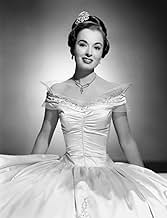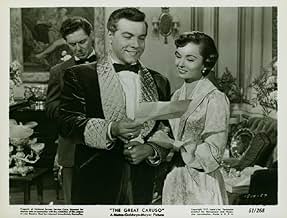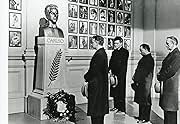Füge eine Handlung in deiner Sprache hinzuThe film explores the life of tenor Enrico Caruso, a vocalist who faces rejection from Musetta and Dorothy, and struggles to find acceptance in New York.The film explores the life of tenor Enrico Caruso, a vocalist who faces rejection from Musetta and Dorothy, and struggles to find acceptance in New York.The film explores the life of tenor Enrico Caruso, a vocalist who faces rejection from Musetta and Dorothy, and struggles to find acceptance in New York.
- Regie
- Drehbuch
- Hauptbesetzung
- 1 Oscar gewonnen
- 4 Gewinne & 6 Nominierungen insgesamt
- Antonio Scotti
- (as Paul Javor)
- Caruso (as boy)
- (as Peter Edward Price)
Empfohlene Bewertungen
Like Caruso before him, and long before the Three Tenors and Andrea Bocelli, Lanza became THE tenor superstar of his generation. If there is anyone who wants to know why, just listen to him sing some of the magnificent arias in this film. "Cielo e Mar," "E Lucevan le stelle," and especially his matchless "Vesti la Giubba," are evidence enough that Lanza could, indeed, have become bigger than Caruso, had not his excesses caught up with him at such a young age.
I have just a couple of negative comments to insert here. First, the plot, while it makes for a good story, actually has very little to do with Caruso's life (Read Enrico Caruso Jr.'s "Caruso: My Father and My Family" for a good, readable biography. He even compliments Lanza and his performance!). For one thing, Caruso didn't die on stage, but several months after that last performance at the Metropolitan. Second, the "Italian" mannerisms in this movie are straight out of the Henry Armetta/"Life with Luigi" school, stereotyped to the hilt.
But, given the overall scheme of things, these are relatively minor complaints. As to the rest, I say that, for those of you who've never heard Lanza and wonder why he was so great, this film will give you ample proof. For those of you who were there when Lanza was in his prime, here's a chance to live it all over again. A great film, and a matchless tribute to TWO of the legendary voices of our time.
Let's be honest from the outset: the movie bears little resemblance to the real Caruso's life, and, yes, it is corny in the grand tradition of Hollywood musicals. But who cares? Lanza's singing is perfection itself, and his vibrant personality overflows in practically every scene. The rest of the cast is good, with top-notch operatic singers Blanche Thebom, Giuseppe Valdengo, et al providing Lanza with some worthy (and rare) vocal support.
Highlights include a superb Vesti la Giubba, a moving Ave Maria and a rapturous Because. In all the movie contains 27 vocal items, with not a dull moment to be found amongst them.
See this movie and revel in a unique vocal talent. In the words of one admirer, Mario Lanza could "outsing the entire Mormon Tabernacle Choir", and the movie is a stark reminder of how bland today's singing idols really are. Enrico Caruso, Jr, was one observer who concurred with this view.While the movie overlooked his existence in favor of his half-sister Gloria, Caruso's son had nothing but praise for the man who portrayed his father:
"Mario Lanza was born with one of the dozen or so great tenor voices of the century, with a natural gift for placement, an unmistakable and very pleasing timbre, and a nearly infallible musical instinct conspicuously absent in the overwhelming majority of so-called 'great' singers. His diction was flawless, matched only by the superb Giuseppe di Stefano. His delivery was impassioned, his phrasing manly, and his tempi instinctively right -- qualities that few singers are born with and others can never attain.
"I can think of no other tenor, before or since Mario Lanza, who could have risen with comparable success to the challenge of playing Caruso in a screen biography."
Well said, Enrico Jnr, and viva il grande Lanza!
Wusstest du schon
- WissenswertesThis was the next-to-last completed MGM film under Louis B. Mayer's supervision (the last was Mississippi-Melodie (1951), released in the summer of that year). A proxy fight soon after would see him removed as the head of the studio he helped to found. He was replaced by his former chief of production, Dore Schary. Mayer ran MGM for 27 years, Schary for barely 6.
- PatzerOpening credits: The events, characters and firms depicted in this photoplay are fictitious. Any similarity to actual persons, living or dead, or to actual firms is purely coincidental. Says it ALL.
- Zitate
Enrico Caruso: It is true, Señor Barretto, that right now I sing for pennies. Pennies are not very important in a big house like this. But the singing, that is important everywhere. It makes people feel good inside, takes away the ugliness, the sadness, and it fills the empty place here. That too is something Señor, isn't it?
- Crazy CreditsOpening credits: The events, characters and firms depicted in this photoplay are fictitious. Any similarity to actual persons, living or dead, or to actual firms is purely coincidental.
- VerbindungenFeatured in The Metro-Goldwyn-Mayer Story (1951)
- SoundtracksThe Loveliest Night of the Year
Lyrics by Paul Francis Webster
Music adaptation by Irving Aaronson
Also performed by Ann Blyth (uncredited)
Adapted from "Sobre las olas" (uncredited)
Music by Juventino Rosas
Top-Auswahl
- How long is The Great Caruso?Powered by Alexa
Details
- Erscheinungsdatum
- Herkunftsland
- Sprachen
- Auch bekannt als
- El gran Caruso
- Drehorte
- Metro-Goldwyn-Mayer Studios - 10202 W. Washington Blvd., Culver City, Kalifornien, USA(studio: made in Hollywood, U.S.A.)
- Produktionsfirma
- Weitere beteiligte Unternehmen bei IMDbPro anzeigen
- Laufzeit1 Stunde 49 Minuten
- Seitenverhältnis
- 1.37 : 1
Zu dieser Seite beitragen























